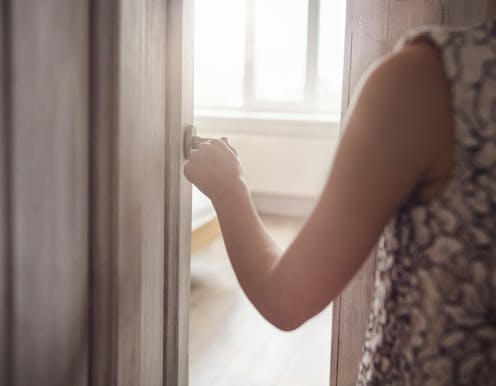What is déjà vu? Psychologists are exploring this creepy feeling of having already lived through an experience before
- Written by Anne Cleary, Professor of Cognitive Psychology, Colorado State University

For example, imagine you’re passing the nursing station in a hospital unit on your way to visit a sick friend. Although you’ve never been to this hospital before, you are struck with a feeling that you have. The underlying cause for this experience of déjà vu could be that the layout of the scene, including the placement of the furniture and the particular objects within the space, have the same layout as a different scene that you did experience in the past.
Maybe the way the nursing station is situated – the furniture, the items on the counter, the way it connects to the corners of the hallway – is the same as how a set of welcome tables was arranged relative to signs and furniture in a hallway at the entrance to a school event you attended a year earlier. According to the Gestalt familiarity hypothesis, if that previous situation with a similar layout to the current one doesn’t come to mind, you might be left only with a strong feeling of familiarity for the current one.
To investigate this idea in the laboratory, my team used virtual reality to place people within scenes. That way we could manipulate the environments people found themselves in – some scenes shared the same spatial layout while otherwise being distinct. As predicted, déjà vu was more likely to happen[13] when people were in a scene that contained the same spatial arrangement of elements as an earlier scene they viewed but didn’t recall.
This research suggests that one contributing factor to déjà vu can be spatial resemblance of a new scene to one in memory that fails to be consciously called to mind at the moment. However, it does not mean that spatial resemblance is the only cause of déjà vu. Very likely, many factors can contribute to what makes a scene or a situation feel familiar. More research is underway to investigate additional possible factors at play in this mysterious phenomenon.
Hello, curious kids! Do you have a question you’d like an expert to answer? Ask an adult to send your question to CuriousKidsUS@theconversation.com[14]. Please tell us your name, age and the city where you live.
And since curiosity has no age limit – adults, let us know what you’re wondering, too. We won’t be able to answer every question, but we will do our best.
References
- ^ Curious Kids (theconversation.com)
- ^ curiouskidsus@theconversation.com (theconversation.com)
- ^ experienced the same exact situation before (onlyhumanaps.blogspot.com)
- ^ known as déjà vu (doi.org)
- ^ neurologists (doi.org)
- ^ writers (www.jstor.org)
- ^ very long time (www.google.com)
- ^ many theories began to emerge (www.routledge.com)
- ^ review of everything researchers had written about déjà vu (doi.org)
- ^ in a book (www.routledge.com)
- ^ investigated a near century-old hypothesis (www.routledge.com)
- ^ FS Productions/Tetra images via Getty Images (www.gettyimages.com)
- ^ déjà vu was more likely to happen (doi.org)
- ^ CuriousKidsUS@theconversation.com (theconversation.com)
Authors: Anne Cleary, Professor of Cognitive Psychology, Colorado State University

